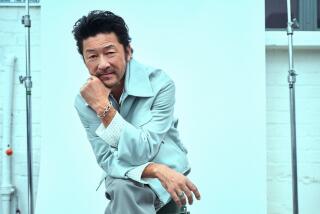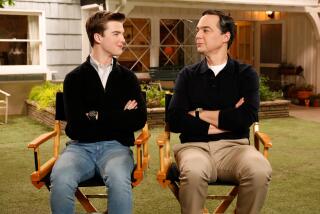‘Lethal’ Challenge
Channing Gibson is celebrating Christmas in July.
That’s good news, because during last year’s Christmas season, the screenwriter of “Lethal Weapon 4” was feeling more heat than holiday cheer.
It was during that period that Gibson, an acclaimed television writer and producer, met with producer-director Richard Donner and Warner Bros. co-chairman Terry Semel about his still-unfinished script for the fourth installment of the popular comedy-action franchise that was scheduled to start a frenzied shooting schedule in only a few weeks.
“I remember Terry looking at me, and I thought, ‘What must be going through his mind?’ ” recalled Gibson, who had never written a major feature before, much less a $120-million to $150-million chapter of one of the studio’s most important film series.
Gibson was also a newcomer to the franchise, which has a reliable core group of Donner, producer Joel Silver and stars Mel Gibson and Danny Glover. And skeptics had argued that “Lethal Weapon” was an aging franchise well past its prime.
“Richard and Terry both looked at me and said, ‘We’re counting on you,’ ” said Gibson (who is no relation to Mel). “Then they added, ‘You’re not planning to leave town this Christmas, are you?’ ”
But despite his ruined holiday and a wildly paced four-month shooting schedule that not only started without a completed script but that often found Gibson frantically churning out pages for that day’s shooting on the set, the producers were more than happy with the results. And now Gibson is enjoying the fruits of his labors.
In its first two weekends, “Lethal Weapon 4” has shot up around $72 million and is on its way to becoming one of the summer’s big hits.
In spite of critical brickbats thrown at the movie by some critics who felt the film was a tired, explosion-filled cliched continuation, its success has prompted some whispered talk about the possibility of “Lethal Weapon 5.” Donner is already talking about working with Gibson again.
“This has been a huge break for me,” said Gibson, who is the polar opposite of the blustery larger-than-life personas of Donner, producer Silver, Mel Gibson and others who have nursed the “Lethal Weapon” movies from the beginning. On the day of the film’s release, he arose early in the morning to play a quiet game of golf--although at times he imagined the ball as the head of one particular critic who hated the movie.
“Lots of doors are breaking down, and I’m being offered a lot of new projects,” said Gibson, though he declined to be more specific. “This has been more than wonderful.”
Donner cannot stop singing Gibson’s praises. “I was so totally impressed with him,” said Donner in an interview from Barcelona, where the film was having a gala premiere this week.
“I liked his humor and he was really quick on his feet,” Donner continued. “We gave him the basic premise, and his approach was phenomenally on the nose.”
More importantly, he said, Gibson said he was most proud of accomplishing his and Donner’s goal on “Lethal Weapon 4,” which was to bring more humanity and emotion to the action-oriented franchise, which is not exactly known for its high quality of plot and character development.
The “Lethal Weapon” movies are anchored by the police detective team of Martin Riggs and Roger Murtaugh (Mel Gibson and Glover), who lace their heroics with comic banter. In the first “Lethal Weapon” in 1987, Riggs was a borderline psychotic who at one point puts a gun in his mouth as if he were going to commit suicide.
Said Donner: “These characters were created by Shane Black, and no one had captured them to the degree that he had. As the series developed, we lost those characters a little, and we wanted to go back and catch them. In ‘Lethal Weapon’ movies, everything comes down to character. When we saw what Channing had, we thought, ‘This guy is a genius.’ ”
Although he was a fan of the “Lethal Weapon” films, Gibson agreed that the series had gotten away from exploring the dark undertones of Riggs. In the current film, Riggs is about to become a father and is skeptical about getting married to his girlfriend and fellow detective Lorna (Rene Russo). Even the traditional final battle between Riggs and the villain is given an unusual twist when Riggs considers walking away from a fight with his latest nemesis, deadly assassin Wah Sing Ku (Jet Li).
“Riggs and his character were largely ignored in ‘Lethal Weapon 2 and 3,’ ” Gibson said. “He’s making commitments in his life after going through what he went through, he’s getting his priorities straight to the point where he has second thoughts about throwing himself into every police situation. Age is an issue. It was time to address all that.”
Other writers who also contributed to the script included Jonathan Lemkin, Alfred Gough and Miles Millar. Writers from the television show “Friends” were brought in to punch up some of the comic dialogue.
Gibson said he approached the sequel as if he were writing the fourth episode of a television series where the characters make a quarter-turn in evolution. He said that he also needed to get back to what made Riggs a lethal weapon in the first place, which occurs during the final battle.
The movie also was the first foray into the action genre for Gibson, who has focused more on the intellectual and cerebral in his previous projects. Beginning his career as a writer for the TV series “Family,” Gibson went on to become a story editor and eventually a producer on the medical drama “St. Elsewhere.”
He joined up with veteran producer Steven Bochco in 1991 and worked on several series; he wrote and co-executive produced “Civil Wars,” wrote and executive-produced one season of “NYPD Blue,” and co-created the critically acclaimed “Murder One.”
After his experience on “Murder One,” Gibson said he wanted to change mediums: “I had no complaints about what I was doing, but I had done dramas for more than a dozen years, and I wanted to do something where I always wouldn’t have to be worrying about next week’s episode.”
Gibson learned about “Lethal Weapon 4” through Donner and Silver, whom he was acquainted with through his rewrites on other Silver-produced scripts. Last summer, Gibson was one of several writers contacted to move full steam ahead on the project, which was put on the front burner because of a sudden vacancy in Mel Gibson’s schedule.
Only about one-quarter of the shooting script was finished when the film went into production Jan. 15. The late addition of hot comedian Chris Rock posed more twists for Gibson and the collaborators. And there were days when Gibson was writing so furiously that there wasn’t time to second-guess what he was doing.
But although there was pressure to finish the project in time for the important summer season, Gibson said he never felt under great stress.
“I would look over at Dick Donner and see that he was relaxed,” Gibson recalled. “I thought, ‘If Dick isn’t going insane, then I should just not worry and concentrate on the work.’ I felt confident that what wasn’t there would get there.”
Donner and Gibson also lauded the cast, which at times would spin off on improvisational riffs. “When you have actors as good as these people are, and they have a good screenplay and a good scene, they start to improvise,” Donner said. “Channing was there the whole shoot, and he stayed with us, was never upset by the improv. He was one of a million.”
As for “Lethal Weapon 5,” Gibson said he had not been approached. “But I would love to do it,” he said.
Said Donner of “Lethal Weapon 5”: “We’ll see. But if there is one, Channing Gibson is the one we want.”
More to Read
Only good movies
Get the Indie Focus newsletter, Mark Olsen's weekly guide to the world of cinema.
You may occasionally receive promotional content from the Los Angeles Times.











